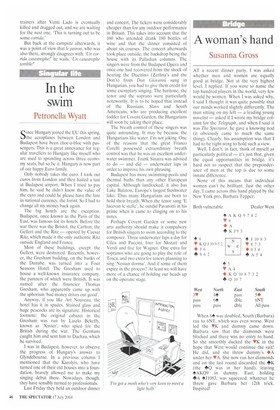In the swim
Petronella Wyatt
Since Hungary joined the EU this spring, Since aeroplanes between London and Budapest have been choc-a-bloc with passengers. This is a great annoyance for regular travellers to Hungary like myself who are used to sprawling across three economy seats, but so be it. Hungary is now part of our happy Euro family.
Only nobody takes the euro. I took out euros from London and then hailed a taxi at Budapest airport. When I tried to pay him, he said he didn't know the value of the euro and could he please have the fare in national currency, the forint. So I had to change all my money back again.
The big hotels are the exception. Budapest, once known as the Paris of the East, was famous for its hotels. Before the war there was the Bristol, the Carlton, the Gellert and the Ritz — opened by Caesar Ritz, which made it the only authentic Ritz outside England and France.
Most of these buildings, except the Gellert, were destroyed. Recently, however, the Gresham building, on the banks of the Danube, was turned into a Four Seasons Hotel. The Gresham used to house a well-known insurance company, the partners of which were British. It was named after the financier Thomas Gresham, who apparently came up with the aphorism tad money drives out good'.
Anyway, if you like Art Nouveau, the hotel has it in spades. Stained glass and huge peacocks are its signature. Historical footnote: the original cabaret in the Gresham was run by Laszlo Bekeffy. known as 'Xavier', who spied for the British during the war. The Germans caught him and sent him to Dachau, which he survived.
I was in Budapest, however, to observe the progress of Hungary's answer to Glyndebourne. In a previous column I mentioned that the Karolyis, who have turned one of their old houses into a foundation, bravely allowed me to make my singing debut there. Nowadays, though, they have sensibly turned to professionals.
Last Friday they held an outdoor dinner and concert. The tickets were considerably cheaper than for any outdoor performance in Britain. This takes into account that the 160 who attended drank 180 bottles of wine and that the dinner consisted of about six courses. The concert afterwards took place outside, the backdrop being the house with its Palladian columns. The singers were from the Budapest Opera and once one had recovered from the shock of hearing the Duettino (Zerlina's and the Don's) from Don Giovanni sung in Hungarian, you had to give them credit for some exemplary singing. The baritone, the tenor and the soprano were particularly noteworthy. It is to be hoped that instead of the Russians, Slays and South Americans, who are producing excellent fodder for Covent Garden, the Hungarians will soon be taking their place.
The breath control of these singers was quite astounding. It may be because the Hungarians like water. I'm not joking. One of the reasons that the great Franco Corelli possessed extraordinary breath control was that he was an excellent underwater swimmer. Frank Sinatra was advised to do — and did — underwater laps in order to improve his own phrasing.
Budapest has more swimming-pools and thermal baths than any other European capital. Although landlocked, it also has Lake Balaton, Europe's largest freshwater lake. Thus many Hungarians are born to hold their breath. When the tenor sang 'E. lucevan le stelle', he outdid Pavarotti in his prime when it came to clinging on to his notes.
Perhaps Covent Garden or some new arts authority should make it compulsory for British singers to swim according to the composer. Three underwater laps a day for Cilea and Puccini, four for Mozart and Verdi and five for Wagner. One extra for sopranos who are going to play the role of Tosca, and two extra for tenors planning to sing `Nessun dorma'. And if some of them expire in the process? At least we will have more of a chance of holding our heads up on the operatic stage.


























































 Previous page
Previous page